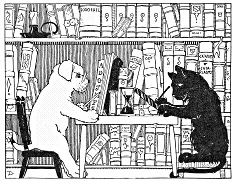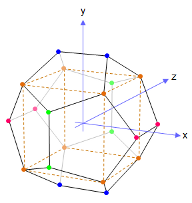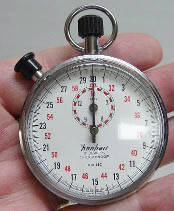Supervisions: Advice
Before Supervisions
- The most important part of the whole process is making the best attempt that you can at the questions. It should be doing you more good than the supervisions themselves, and you should devote plenty of time to it.

- Students sometimes think that it would be cheating to look in a textbook for help with a question, or talk it over with a friend. This is nonsense. Of course it would be rather pointless just to copy out someone else's answer to a question, but any talking over how to approach a question with anyone else is an unmitigated good, as is any and all reading of textbooks. (This doesn't apply to exams, of course. There are rules about that sort of thing.)
- Don't worry if you can't get everything right first time. Sorting out the things that you couldn't do or got wrong is what the supervisions are for! Do what you can, and hand it in even if it's incomplete.
- Some students write little notes on their work, sometimes in different colours, or stick post-it notes to it, to highlight things that they didn't understand properly, and want to ask about more. This isn't compulsory, but it's not a bad idea.
- If you have any questions about the lectures, then it's useful to put a bookmark or post-it note in the offending sections of the lecture notes and bring them to the supervision. This makes it much quicker and easier for you to tell your supervisor what you haven't understood (or, as it occasionally turns out to be, what the lecturer has got wrong).
- There are more hints on doing questions in the last section on this page.
- Make sure that you hand your work in!
During Supervisions
- Bring your copy of the question sheet to the supervision with you.
- It can be a good idea to make some notes during the supervision, possibly on your work itself. This makes sure that you don't forget everything that you learnt immediately afterwards. However, it's important not to write down everything that your supervisor writes. If you do this, you'll be writing most of the time, and won't have chance to think properly about what's going on. Just write down a few key lines, and reconstruct the rest of it afterwards. (See the next section.)
After Supervisions
- Any understanding gained during supervisions tends to seep away afterwards. In order to grab hold of this understanding and stop it from escaping, it's important to go through the supervision afterwards, preferably the same day while it's still fresh in your mind. It's a good idea to have another go at any questions that you couldn't do or got wrong. (There's no need to do this if you just made algebraic errors and now know what they are.)
- I'm always happy to re-mark corrected versions of questions if you want to check that you've got something right on a second (or third...) attempt. It's completely up to you whether you want to hand them in. Check with other supervisors before giving them corrections to mark - most of us like them, but some don't.
- I produce worked solutions for some questions. These are only provided some time after the questions were set: they're mainly meant for revision. There's very little value in looking over worked solutions to a problem that you haven't attempted first.
Ramblings on how to do Difficult Questions in Physics and Maths
- People often find the experience of struggling to get anywhere with a question a frustrating one. Well, it is, but it's also the only way to learn how to do mathematical physics, just as making abominable wailing noises for hours on end is the only way to learn how to play a violin.* Every time that you try something that doesn't work, you learn a bit more about the method that you tried (that doesn't work here, but would work somewhere else). Sometimes people make the mistake of thinking that they are doing something wrong if it is taking them a long time, and several false starts, to complete a question. On the contrary, they are doing the one thing that is most right. (Of course, it's nice if you can, straight away, see the best solution to a problem. But if you can do this all the time, you should be finding some harder questions to challenge yourself.)

- If you can't see any way of approaching a question at all, then it's a good idea to write down which pieces of information you know: summarize the question, and introduce some notation.
- Give names, perhaps, to the things that you don't know, whether the question is telling you to find them or not.
- And draw a diagram. In fact, draw a diagram even if you do think that you know how to do the question. The diagram will make everything clearer. Draw it nice and big, and label it with everything that you know.
- Questions involving three-dimensional geometry often benefit from multiple diagrams, because it's useful to look at two-dimensional slices of a three-dimensional problem. See the worked solutions for examples of this.
- Do not make the mistake of thinking that, because you have already drawn one diagram for a question, it won't benefit from another. Often it will.
- When you've spent a long time staring at a question and are thoroughly fed up of it, it can be a good idea to try something else, whether it be another question, a domestic chore, a walk outside, or a tea break. Sometimes you will find that a new and useful idea will come to you with a change to focus or scene. The fact that you have found a solution whilst operating a kettle which eluded you when staring at a page densely covered with scribblings doesn't mean that the time spent scribbling was wasted. On the contrary, it created the state of mind in which a flash of inspiration was possible.
- If you can't get anywhere at all with a question, and are supposed to be handing it in for a supervision, don't hand in nothing. Instead, hand in your re-statement of the question, and diagrams, and, if they're remotely legible, the things that you tried that didn't work. Not only does this make sure that your supervisor knows that you've been working: it also allows him to explain how you could have got from where you were to where you needed to be. And this is often useful.
- Sometimes you have worked out how to do a question, and got an answer, but you know (because the question is of the "show that" type, or the answers are at the back) that your answer is wrong. Perhaps it is out by a factor of 2, or 10, or -1, or twice pi, or something.
- The first thing to do is to look back over your work to see if you can find the mistake. But after a little while you can start to feel as if you're waiting for an enlightenment that just isn't going to come.
- The right thing to do now is to start again. Put your original work aside, don't look at it, and do everything again from the beginning. Of course there's a risk you'll just make the same mistake again, or that your method is really flawed in a more fundamental way than just an algebraic error. But quite often it just works. So take a deep breath and start again.
- There is a way that supervisors have of finding where the mistake has crept in, especially in physics work, that looks to the uninitiated almost like a superpower. I'm not sure whether I should reveal the method here, or whether it should be regarded as a trade secret. By way of compromise I shall just quote the incantation that we tend to use when we have all-too-quickly found an error. We say "Well, here is where it becomes dimensionally incorrect". I'll leave you to work out whether you could acquire the superpower for yourself.

- When practising Tripos questions, two approaches suggest themselves.
- One is to do the questions under exam conditions, allowing yourself exactly the time that you'd have in an exam, and referring to no notes or textbooks.
- The other approach is to treat them like any other question: to take as long as you need, and use as many other resources as you need, to produce the best answers that you can.
- The first approach is good for building up the ability to work under pressure, but means that you miss out on doing large parts of the questions. It can also be rather demoralizing.
- The second approach means that you learn much more, but are under-prepared for the exam.
- Fortunately, you can do both! First try the questions under timed conditions, without notes. Then, once your time is up, go back, and try to finish (and correct) what you've done so far, using anything that you need to help. I think that this is almost always the best thing to do.
- Tripos questions are hard, but they are supposed to be hard. If any student in the entire year can do a full set of them, and get everything right, during the exam, then the examiner hasn't done their job properly!
- I fear that the ramblings above may be misconstrued as being motivational. What is needed when doing mathematical physics is not really motivation or de-motivation. These are emotional responses, and the mathematics doesn't care about your emotional state. What is needed is clear, dispassionate (but imaginative) thought about the specific details of the problems at hand. It may sound paradoxical (and be difficult to do in practice) but the less you worry about how well you are doing and how much you are enjoying it, the better you are likely to do and the more enjoyable it is likely to be. (This does not mean that you should worry about worrying. That would be silly.) The one thing that you need to do is to spend an appropriately large amount of time working, whether doing questions, filling in gaps in your understanding of lecture notes, talking to friends about the questions, or whatever. Do this, and all will be well.
* Ma per trattar del ben ch'io vi trovai / Diro de l'altre cose ch'io v'ho scorte - Dante.